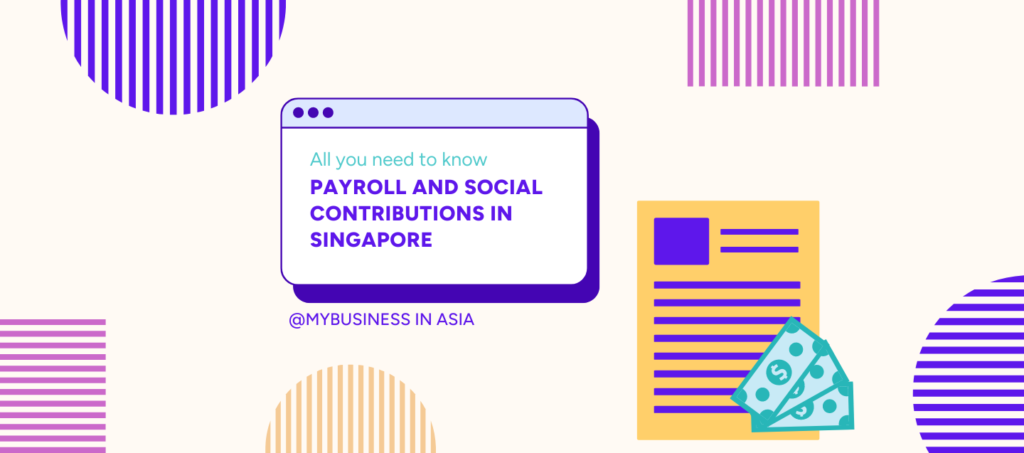
In Singapore, employers are required to issue to all employees itemized payslips, given together with the payment. We will tell you all about payroll and contributions in Singapore.
Employers are also required to keep records of payslips for their current employees for the latest two years. For former employees, they need to keep the last two years of records, for one year after their last day of employment.
In this article, we will cover:
- What are the items to include in payslips?
- Social Contributions in Singapore
- Donations and Contributions Deducted through Salaries
- Skills Development Levy (SDL)
What are the items to include in payslips?
- Full name of both the employer and employee
- Date of payment
- Basic salary
- Start and end date of the period
- Allowances
- Additional payment, if any (examples are bonuses and public holiday pay)
- Deductions, if any (examples are employees’ CPF contribution and life insurance premium)
- Overtime pay, including hours worked and period, if it differs from point 4
- Net salary
Social Contributions in Singapore
Employers are required to pay CPF contributions for Singapore Citizens or Singapore Permanent Residents who earn total wages of more than SGD 50 per month.
The CPF rate for employees aged 55 years and below is 37%. With effect from 1 January 2022, there is a change in the rates for employees aged above 55 years:
|
Employees’ age |
CPF Contribution Rates from 1 January 2022 (Monthly Wages > SGD 750) | ||
|
(Years) |
Total |
Employer (% of Wage) |
Employee (% of Wage) |
|
55 and below |
37 |
17 |
20 |
|
Above 55 to 60 |
28 (+2)* |
14 (+1)* |
14 (+1)* |
|
Above 60 to 65 |
18.5 (+2)* |
10 (+1)* |
8.5 (+1)* |
|
Above 65 to 70 |
14 (+1.5)* |
8 (+0.5)* |
6 (+1)* |
|
Above 70 |
12.5 |
7.5 |
5 |
* Increase in rate in percentage
For employees who just acquired their Permanent Residents status, there are progressive rates for the first two years of its acquisition.
Employment Pass and S Pass holders aren’t contributing to CPF.
Donations and Contributions Deducted through Salaries
Employers are expected to deduct Self-Help Groups (SHG) contributions from employees’ wages, based on employees’ race or religion.
The different funds are the following:
- CDAC: Chinese Development Assistance Council
- ECF: Eurasian Community Fund
- MBMF: Mosque Building and Mendaki Fund, for the Muslim or Malay employees
- SINDA: Singapore Indian Development Association
Employees are contributing for a fixed amount, depending on their salary and on the Fund they are contributing.
Donations and contributions deducted through salaries for SHG contributions are entitled to a tax deduction, knowing that employees can also decide to opt-out of the payment of these contributions.
Skills Development Levy (SDL)
Employers are required to pay monthly SDL for all employees working in Singapore. Funds collected through SDL will be used to support workforce upgrading programs.
The SDL contribution rate is 0.25% of the salary, subject to a minimum of SGD 2.00 and a maximum of SGD 11.25.
Individual Tax Returns
Employers are required to prepare Form IR8A and Appendix 8A, Appendix 8B, or IR8S (where applicable) for employees working in Singapore by the 1st March of the following year.
Employers with 5 or more employees in the current year must do their return to IRAS through the Auto Inclusion Scheme (AIS) for employment income.
IR8A must be completed for all employees. Appendix 8A must be completed for employees who are provided benefits-in-kind, Appendix 8B must be completed for employees who gained from Stock Option plans and IR8S must be completed if claims are/will be made on excess CPF contribution.
All about accounting services in Singapore and secretarial corporate services in Singapore.
Tax Clearance
Employers have the responsibility to seek tax clearance for their non-Singapore citizen employees, who are ceasing employment, going on an overseas post, or planning to leave Singapore for more than 3 months.
Employers must file Form IR21 at least one month before an employee ceases employment, starts an overseas posting, and leave Singapore for more than 3 months.
All monies due to the employee must be withheld for tax clearance purposes.
Employers are not required to file tax clearance for Singapore Permanent Residents (SPR), who are not leaving Singapore after ceasing employment.
A Letter of Undertaking (LOU) must be obtained from the employees declaring that they will not be leaving Singapore permanently.


